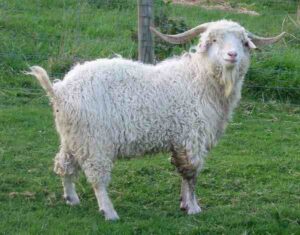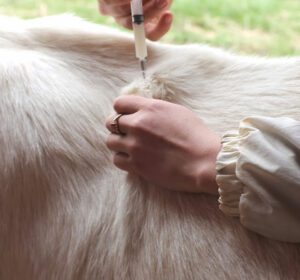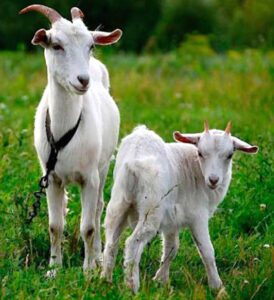Do you know the functions or necessity of ammonium chloride for goats? If no, then you are in the right place. Here we are trying to describe more about the functions of ammonium chloride for goats.
Ammonium chloride and some other minerals are very important for the proper functioning of an goat’s body. Stones in the bladder of goats causes due to lack of proper diet.
Ammonium chloride for goats is a must, because it changes the pH of urine in a way that prevents excess minerals from crystallizing into stones.
So learning more about how ammonium chloride for goats work is very important for treating and preventing stones in the bladder.
Sometimes the body of a goat become unable to absorb or process necessary minerals properly. One the consequences of such malfunction of the body is the formation of stones.
This condition is known as urinary calculi (when stones are formed in a goat’s urinary tract). It’s become very difficult for the goat to pass urine, when these stones are formed.
Ammonium Chloride For Goats
Ammonium chloride helps the goats for treating and preventing this condition. That’s why ammonium chloride is very important for goats.
Urinary calculi usually afflicts the male goats. Although female goats may also have these stones in some cases. But it’s rare in the female goats.
Male goats have long urethrae that are twisted and have many turns. That’s the reason for the high incidence of this condition in male goats. But the urethrae of female goats are straight and short.
So this condition is rare in female goats. Passing any solid particle is much easier for females than for the male goats. The wethers are more prone to urinary calculi than the bucks and does.
So you have to be very careful, especially if you are raising goats for the purpose of commercial meat production.

Your regular goat feed should contain proper amount of nutrition. Because for causing urinary calculi, nutrition plays an important role.
Ensure the regular diet of your goats have a proper ratio of phosphorus and calcium. The proper ratio of calcium and phosphorus should ideally be 2:½ (never fall bellow 1:1).
Always remember, too much phosphorus in the goat feed causes formation of stones in goats. Be very careful feeding your goats grain concentrates.
Too much concentrates with high levels of phosphorus (as compared to calcium) results the formation of stones in the goat’s bladder.
Test the mineral level of hay and water, if you don’t feed your goats grain concentrate but fed them on a forage diet.
Some types of hay are enriched with high phosphorus content. For example, Bermuda grass contain high amount of phosphorus content.
The amount of phosphorus will be higher in the hay, if you fertilized the land by using chicken litter. For restoring calcium:phosphorus ratio to the optimum level, you can add calcium carbonate.
Check the pH level of your goat’s drinking water. Because, sometimes acidity level of water may also cause urinary calculi. The pH level in the goat’s drinking water should be neutral.
Prevention
Prevention is better than cure. So if you take proper preventive steps, then you will be able to keep your goats free from urinary calculi. Using ammonium chloride for goats helps for treating and preventing this condition.
In most cases, producers use ammonium chloride for meat goats. Because meat goats are usually fed a high grain diet. When normal pH of urine changes, then the stones are formed.
Changing in normal pH of urine causes the minerals to crystallize and form stones in the goat’s bladder.
Ammonium chloride prevents the formation of stones by making the urine pH acidic. Follow the table below while adding the proper amount of ammonium chloride for goats diet.
| Ammonium Chloride | Pounds Per Ton of Feed | For Topdress Feed |
| 0.50% | 10 Pounds | ½ tsp (2.24 gram) |
| 1.00% | 20 Pounds | 1 tsp (4.54 gram) |
| 1.50% | 30 Pounds | 1½ tsp (6.81 gram) |
Along with including ammonium chloride in your goat’s diet, follow the steps below for preventing urinary calculi in goats.
- Always try to provide your goats sufficient amount of clean and fresh water.
- Ensure the calcium and phosphorus ratio in goat’s regular diet is 2:1.
- For increasing daily water intake, add about 3% to 4% salt in the goat’s regular diet. Doing this will be very helpful for your goats.
- Avoid delay castration.
Treatment
Take the animal to the vet, if the flow of urine is completely blocked. In such condition, surgical procedures are the only way to provide relief.
In case of partial blockage in expulsion of urine, giving an oral drench treatment can be helpful for dissolving the stones from the goat’s bladder. Follow the table for making such a drench.
| Goat’s Weight | Ammonium Chloride per Gallon Water |
| 30 Pounds | 0.78 lbs |
| 45 Pounds | 1.17 lbs |
| 60 Pounds | 1.56 lbs |
| (The figures are for a mixture of 0.26 grams of ammonium chloride per kg of body weight) |
Provide the goat 40 cc of mixture (based on the table above). Keep in mind the toxicity of ammonium chloride. Ammonium chloride helps to clean the blockage of the urinary tract. In some cases it is the only option.
But before applying any medicine or treatment, always consult with any of your nearest vet. And always provide your goats sufficient amount of clean drinking water and adequate nutritious foods.
Frequently Asked Questions
People ask many questions about the necessity of ammonium chloride for goats. Here we are listing the most common questions about this subject, and trying to answer them. Hope you will find your answer. Don’t hesitate to ask us if you have more questions.
Is ammonium chloride good for goats?
Yes, ammonium chloride is good for goats. Ammonium chloride can help to prevent stones. Most of the commercial goat feed manufacturers add this mineral to their feeds. But if you rely on natural foods for feeding your goats, then you should provide your goats with additional ammonium chloride.
What is ammonium chloride used for in animals?
Ammonium chloride is used in veterinary medicine (for goats, cow etc.), the major therapeutic use is as an urine acidifier in animals with urinary tract infection, for which purpose it is usually administered orally.
Is ammonium chloride safe for animals?
Yes, giving ammonium chloride in right doses is completely safe for the animals.
How fast does ammonium chloride work?
Ammonium chloride works very fast. It should take effect within 1 to 2 hours. The oral formulations should be mixed with food as they have strong bitter taste.
Is ammonium chloride harmful?
Yes, excessive intake of ammonium chloride can be harmful. It may also cause an asthma-like allergy.
What is the purpose of giving ammonium chloride?
Ammonium chloride is a systemic and urinary acidifying agent that is converted to ammonia and hydrochloric acid through oxidation by the liver. Intravenous ammonium chloride is a treatment option for severe cases of metabolic alkalosis.
What happens when ammonium chloride is mixed with water?
Ammonium chloride when dissolved in water it hydrolyses to form ammonium hydroxide and hydrochloric acid.
Is ammonium chloride safe for sheep?
Ammonium chloride in complete diet for lambs for fattening at the maximum dose of 1 % is considered safe for a limited period of feeding (approximately three months).







I have three Nigerian Dwarf goats. They eat orchard grass – blackberry brush and get one cut of grain every night. They are pet goats. Can I add Ammonium Chloride to their nightly grain? If sh how much should I add?
You can mix the Ammonium Chloride with a little molasses. But you shouldn’t give grain to wethers.